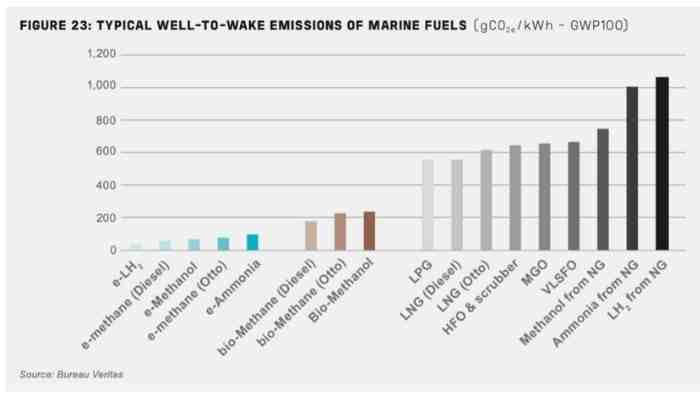[ad_1]
Bureau Veritas (BV), a world chief in testing, inspection and certification, has launched an in depth outlook on future maritime fuels in a brand new white paper, which requires a “well-to-wake” (WtW) method to assessing the local weather impression and sustainability of other fuels.
This is among the key conclusions of the white paper, which evaluates different fuels resembling methanol, LNG, biofuels, hydrogen and ammonia, outlining their respective traits, benefits, challenges, availability, security, and greenhouse gasoline (GHG) emissions.
A well-to-wake method accounts for all GHG emissions launched from the extraction or manufacturing section, the distribution of the gas, via to the ultimate use onboard vessels, versus simply the emissions ensuing from combustion on board.

The white paper requires a sustainable gas manufacturing pathway for different fuels, highlighting that even carbon-free fuels might have a carbon-intensive provide chain which means they may generate increased WtW emissions than the fossil fuels they intend to interchange. This positions electrofuels (e-fuels), that are produced from renewable vitality, in addition to sustainably sourced biofuels, as a few of the most promising choices to decarbonise transport.
Paul Delouche, Technique Director at Bureau Veritas and lead writer of the report, mentioned: “Assessing different gas choices have to be finished from a well-to-wake foundation to attain true decarbonization within the transport business. Solely via an entire life-cycle evaluation can the environmental impression of fuels be correctly evaluated. Understanding how these fuels are produced and transported is paramount.
“Subsequently, attaining decarbonization in WtW phrases would require unprecedented collaboration and transparency with upstream and manufacturing chains, together with a broad vary of stakeholders from vitality and chemical suppliers to authorities and financiers. The maritime world has chosen to decarbonise, and the one technique to succeed is to collaborate, sharing information and assets throughout the business and past.”
The white paper describes how the business will see a mixture of different fuels within the close to future, with gas selections influenced by vessel’s sorts, sizes and operational profiles, in addition to the provision of the fuels and bunkering infrastructures at scale. Entry to renewable electrical energy on a big scale can be key to supply e-fuels and hydrogen, and a cross-sector method can be wanted to share assets resembling wind and solar energy between maritime and different sectors.
The business can even be affected by a spread of incentives, together with laws and market-based measures, which might be being developed by regional and world regulators. The white paper exhibits that present EU ETS and FuelEU Maritime proposals, as an example, may end in vital ranges of taxation and penalties for ships. For FueEU Maritime, the impression can be comparatively average till 2035, however theoretically reaching very excessive ranges from 2040 onwards.
Ulrik Dan Frørup, Chief Industrial Director at Bureau Veritas Marine & Offshore, mentioned: “Altering marine fuels will necessitate main modifications to the complete gas provide and logistics chain. This may have an infinite impression on maritime companies worldwide. The clock is ticking all the way down to 2050, and the earlier we decarbonise, the higher. At BV, we consider that the maritime world will achieve in prominence in a decarbonised future, turning into the spine of low- and zero-carbon transportation.
“The business should steadiness short- and long-term aims, acquiring fast GHG emissions discount from the prevailing fleet, whereas shifting towards extra substantial emissions aims within the mid- to long-term. At Bureau Veritas, we recognise that everybody will begin their sustainability journey from completely different locations and transfer at completely different speeds, and we’re right here to help the business in the important thing selections forward. We additionally play a key position in growing the foundations and danger evaluation frameworks that make secure innovation potential, thereby serving to transport make new fuels and different decarbonisation options a actuality on world fleets.”
Press Launch

Newest Transport Information
[ad_2]
Source_link












